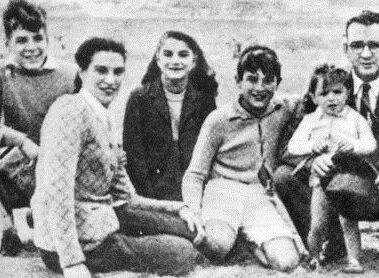[caption id="attachment_71817" align="aligncenter" width="600" caption="The Chapel of St. Basil at St. Thomas University in Houston. The college, a growing center for Irish studies, is named after St. Thomas Aquinas."]
Each day, the Irish diaspora, rejuvenated by a new wave of emigrants, is becoming ever more connected even as its members disperse to every corner of the globe.
The benefits of the internet in connecting the Irish abroad with Ireland, and each other, has been well documented with the likes of Facebook and Skype now having important roles in the lives of Irish families.
However, in spite of the luxury of having this increasingly essential way of communicating, this virtual space has not replaced the need for a real social network in real spaces that the new members of the Irish diaspora want to tap into.
The multitude of authentic Irish pubs from Melbourne to Manhattan, Munich to Minneapolis and everywhere in-between are a testimony to how naturally the Irish converge socially and will always look to create a physical social space.
The desire to network is largely for social reasons and career building but whatever reason the new wave of Irish emigrants want to connect with each other, the most important thing is that they do.
Whether it is joining a GAA club, a business network, or attending cultural and social events, what is important is that this new outflow of Irish citizens connects to the wider Irish diaspora.
The framework for a tangible social network exists due to the legacy of previous generations, and in their experiences lies a real lesson of Irish history that should resonate with the new wave of Irish citizens migrating around the globe: The fortunes of Ireland have always been intertwined with the fortunes of the Irish diaspora, and the fortunes of the diaspora rely on its members building a strong social network.
The ability of the Irish diaspora to generate social capital that intersects the world of education, culture, business and politics will once again be the rising tide that lifts all boats.
From the Great Famine to the election of JFK, the Irish community in America overcame poverty and prejudice through the formation of a social network that intersected every aspect of American society. Through a network of societies and organizations, including the Ancient Order of Hibernians, police and fire departments, county associations, Irish pubs, the GAA and other sports clubs, a social capital was generated that supported Irish ambitions to become leaders in industry, education, the legal system and politics.
Some of the less palatable, yet no less influential, aspects of this social network, including Tammany Hall and the Irish Mob, are now just testimony to the rough and tumble journey of the Irish in America.
From the building sites of New York and Chicago, to the mines of California and Montana, to the swamps of New Orleans, the adhesive that connected the Irish diaspora was the hope for a better life for their kin in America and Ireland, and an overarching Catholic Church.
While the push and pull factors that brought the Irish in America together may have dissipated in the 21st century, the hope for a better life has not gone away.
In the second half of the 20th century, the Irish in Britain also overcame the obstacles of poverty and prejudice through a social network that brought the Irish together in the face of these huge challenges. As a result, like Irish America, the Irish in Britain would come to intersect the world of politics, culture, business and sport in a way that contributed so much to the buoyant relations that the people of Britain and Ireland enjoy today.
The traditional social network of the Irish community in Britain remains the Irish social and cultural centers, Irish societies, business networks, the GAA and other sports clubs. Again, the cement that built a concrete social network was a better future for their families and Ireland.
The Catholic Church was also a key factor in this network with its influence felt throughout the community, not least for the less fortunate members of the community. The huge changes that reversed the fortunes of Ireland in the last twenty years, including peace, prosperity and the ability to punch above weight, whether on the sports arena or in the arts, was a direct result of an influential Irish diaspora.
This is an important lesson that the new wave of Irish emigrants should heed as they must come to realize that they are now the frontier on which a better future for their families, friends, and for Ireland. will be built.
Well-traveled, highly skilled and highly educated, the new generation of Irish emigrants has the potential to become leaders in business and politics wherever they settle, from Hawaii to New Zealand and everywhere in between.
Many, of course, already are, and a real tangible social capital exists amongst the Irish diaspora. Of course. there are members of the diaspora who do not feel any obligation to associate with other Irish people, or Ireland, and indeed nobody should feel obliged to associate with anyone else.
However, for any Irish person who wants a brighter future for their families, friends, or just want to go home, then they need to understand that there is no greater force for change than when the Irish come together.
In London, for example the GAA has seen a large increase of men and women joining. Last year, the Irish community in Houston, Texas, perhaps in the absence of an existing Irish social network, sought to create its own social space to overcome the physical barrier of the large urban sprawl that is America's fourth largest city.
With the assistance of the Irish Studies Center at the University of St. Thomas, they established a new GAA club. Houston is a clear illustration of the benefits of merging the initiative of a young Irish community with the wider established diaspora, thus generating significant social capital.
In this case, the Irish Studies Center at St. Thomas formed a pivot at the intersection between the established diaspora and its new members, many of whom work for top American companies and institutions.
The William J. Flynn Irish Studies Center is itself a testimony to the importance of the Irish diaspora for the fortunes of Ireland. In less than a decade, the center has become a beacon for all things Irish in Houston, primarily educating university students about Ireland, the Irish and their history, language and culture.
The founder and director of the Center, Dr. Lori Meghan Gallagher, has demonstrated how the strongest areas of the economy in Houston, such as technology, energy, science, medicine and biomedical technology, complement key businesses in Ireland.
The center's role in connecting Ireland with the economic behemoth that is Texas has not gone unnoticed by the Irish Consulate in Chicago which actively supports the center. Representatives from the consulate regularly attend the prominent social and cultural events the center holds in the city.
If the social capital generated in Houston by a small but integrated multi-generational Irish community was replicated throughout the rejuvenated Irish diaspora in America, Britain and elsewhere, the impact on the fortunes of the Irish diaspora and Ireland could be momentous.
Originally from Waterford, David Keniry has previously worked and traveled in the U.S. and is now resident in London and active in the city's Irish community.y








